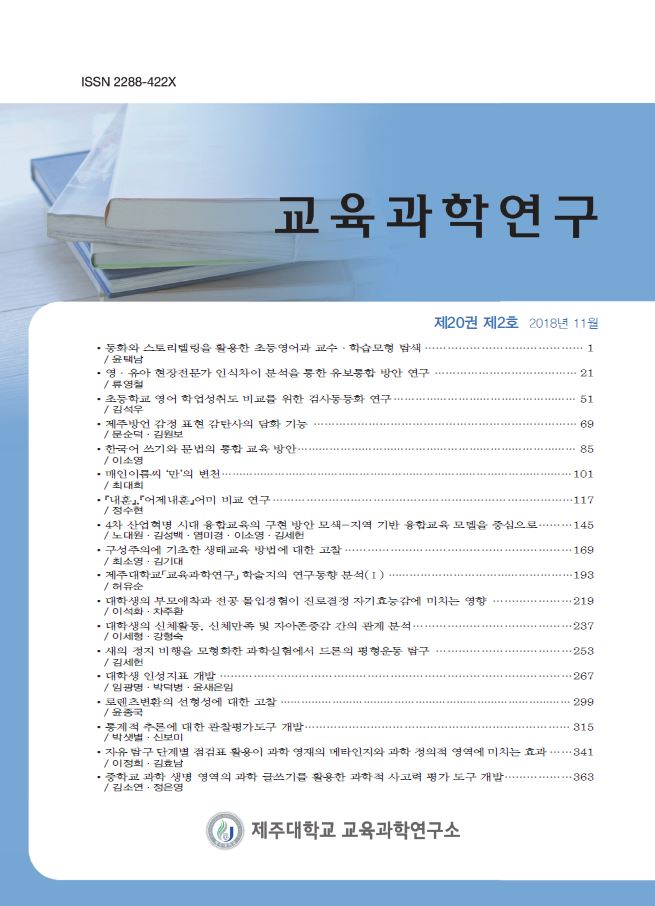국어문법에서 감탄사는 감정 감탄사, 의지 감탄사로 분류하는 것이 일반적다. 감탄사는 구어 표현에서 자연스럽게 발화되므로, 문법 의미보다는 담화 의미로 해석할 때 각 단어의 의미가 분명해진다. 이에 감정 표현의 감탄사는 발화 상황에서 그 의미가 좀 더 명확해지므로, 담화 의미로 접근하는 것이 감정 감탄사의 의미를 정확하게 해석할 수 있다. 따라서 이 글은 제주방언 감정 표현 감탄사인 ‘ᄋᆞ따가라, 메께라, 메, ᄎᆞ마가라’ 등을 대상으로 담화 의미를 살펴보았다. 제주방언 감정 표현 감탄사 ‘ᄋᆞ따가라’는 나무람, 비난, 책망, 대화중지, 대화거부, 부정 등의 담화 의미를 지니고 있는데, 이 의미들은 후행 발화에 따라 달라진다. 제주방언 감정 표현 감탄사 ‘메께라’에는 강한 부정, 거부, 책망, 나무람, 비난, 못마땅함, 단정 등의 담화 의미가 내포되어 있다. 제주방언 감정 표현 감탄사 ‘메’는 강한 부정, 요구 거절의 담화 의미로 쓰인다. 제주방언 감정 표현 감탄사 ‘ᄎᆞ마가라’에는 화자의 강한 부정, 거부, 책망, 단정 등의 담화의미가 내포되어 있다. 따라서 제주방언 감정 표현 감탄사 ‘ᄋᆞ따가라, 메께라, 메, ᄎᆞ마가라’ 등은 상대방의 행동을 나무랄 때, 화자의 맘에 들지 않을 때(흡족하지 않은 상태) 등 화자의 입장에서 청자의 말이나 행동을 비난하는 담화 의미가 내포되어 있다.
In the Korean grammar, it is common to classify exclamations as either an emotional or a wilful exclamation. Since an exclamation is spontaneously spoken in the colloquial language, its meaning becomes clear when it is dealt with from the perspective of the discourse meaning rather than the grammatical meaning. Therefore, since the function of exclamations expressing emotion gets clearer in the utterance situation, a discourse approach to their meaning can help us interpret the meaning of an emotional exclamation more accurately. Therefore, this study has examined the discourse meanings of the emotional exclamations in the Jeju dialect such as ‘ɔttagala(ᄋᆞ따가라: ɔ for ᄋᆞ in the Jeju dialect)’, ‘mekkela(메께라)’, ‘chɔmagara(ᄎᆞ마가라)’, and ‘me(메)’. The exclamation ‘ɔttagala’ expressing emotions in the Jeju dialect indicates the discourse meaning of scolding, blame, reproof, interruption or refusal of conversation, or denial and the trailing speech decides one of these meanings. Jeju dialect emotional exclamations such as ‘mekkela’ and ‘mesikela(메시께라)’ convey the discourse meaning of ‘strong denial, rejection, reproof, scolding, criticism, dissatisfaction and assertiveness’. The exclamation ‘chɔmagala’ in the Jeju dialect shows the discourse meaning of a speaker’s strong denial, rejection, reproof and determination. The Jeju dialect emotional expression ‘me’ has the discourse meaning of strong denial and demand rejection. Therefore, the emotional expressions ‘ɔttagala’, ‘mekkela’, ‘chɔmagara’, and ‘me’ in the Jeju dialect are used to imply the discourse meaning that condemns a listener’s words or actions in a speaker s position, especially when a speaker blames or does not like a listener’s act.
Ⅰ. 서 론
Ⅱ. 감정 표현 감탄사의 담화 기능
Ⅲ. 결 론
